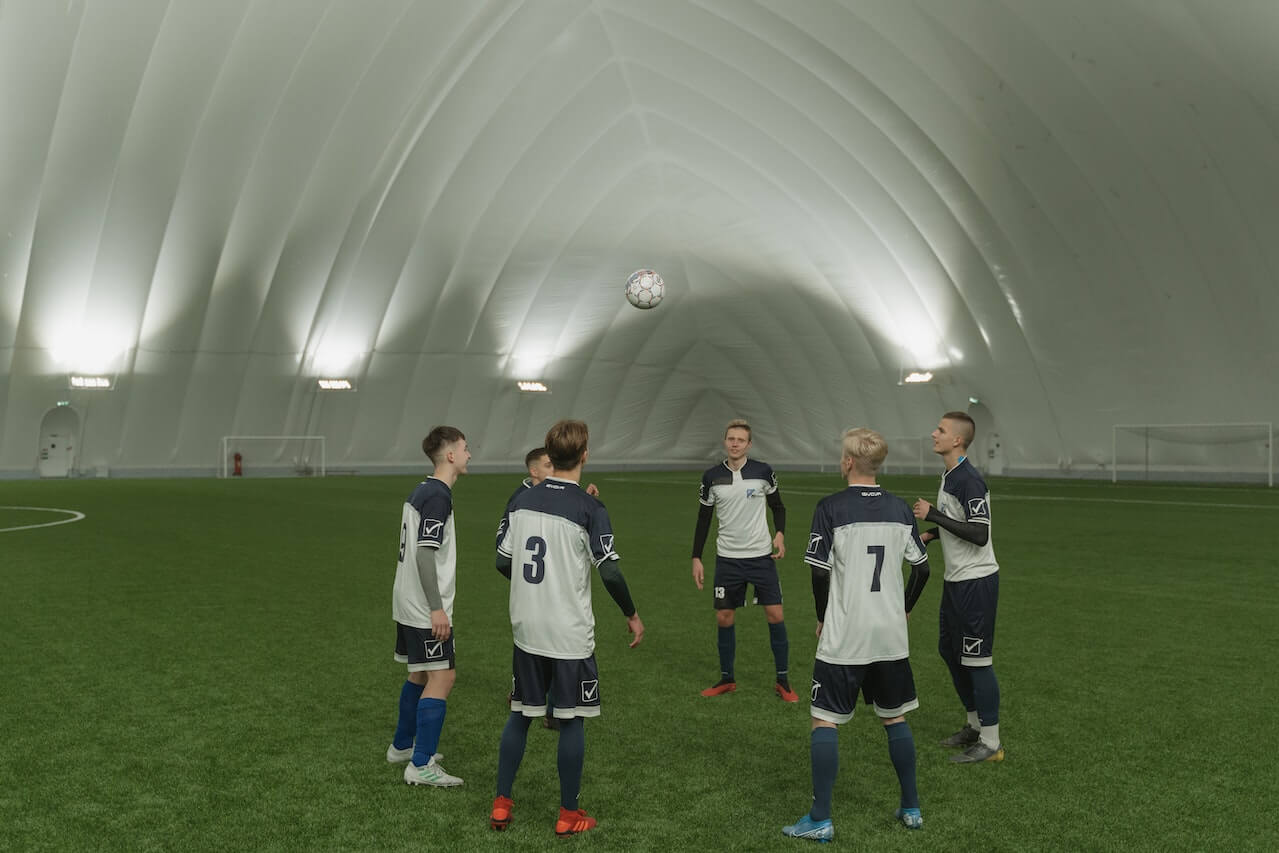If you want to become a successful soccer player, you need to train like one. Training for soccer involves a combination of physical and mental preparation, as well as mastering the technical skills required to excel on the field. Whether you are a beginner or an experienced player, a well-designed training program can help you improve your game and achieve your goals.
Physical training is an essential component of soccer. Endurance, speed, agility, and strength are all important attributes that can be developed through regular exercise and conditioning. A well-rounded training program should include a variety of exercises that target different muscle groups and energy systems, as well as drills that simulate game situations and help you improve your decision-making and reaction time.
The Importance of Physical Fitness in Soccer Training
To be a successful soccer player, physical fitness is essential. You need to be in top shape to perform at your best and avoid injuries. Here are some reasons why physical fitness is important in soccer training: Firstly, soccer is a high-intensity sport that requires a lot of running, jumping, and quick movements. To keep up with the pace of the game, you need to have good cardiovascular endurance. This means your heart, lungs, and muscles can work efficiently for extended periods of time without getting tired. To improve your endurance, you can do exercises such as running, cycling, or swimming. Secondly, soccer also requires strength and power. You need to be able to jump high, kick hard, and tackle effectively. Building muscle strength and power can help you achieve these goals. You can do exercises such as squats, lunges, and plyometrics to improve your strength and power. Thirdly, agility and coordination are also important in soccer. You need to be able to change direction quickly, maintain balance, and control the ball with your feet. Agility and coordination can be improved through drills such as ladder drills, cone drills, and ball control exercises. Lastly, physical fitness can also help prevent injuries. When you are in good shape, your muscles and joints are more resilient and less prone to injury. Stretching and warm-up exercises before games and training sessions can also help prevent injuries. Overall, physical fitness is a crucial component of soccer training. By improving your endurance, strength, power, agility, and coordination, you can become a better soccer player and reduce the risk of injuries.
Technical Skills Training
When it comes to soccer, technical skills are crucial to success on the field. Technical skills refer to the abilities required to control the ball, pass accurately, and shoot effectively. These skills are developed through consistent and deliberate practice, which can be achieved through a variety of drills and exercises.
One important technical skill to focus on is ball control. This involves being able to receive passes, dribble the ball, and change direction quickly. A useful drill for improving ball control is the cone drill, where you set up a series of cones and practice dribbling through them while maintaining control of the ball.
Passing accuracy is another key technical skill. A good way to improve your passing is to practice with a partner, focusing on passing the ball accurately and with the correct technique. You can also practice passing against a wall, which will help you develop a stronger and more accurate pass.
Finally, shooting is perhaps the most important technical skill in soccer. Shooting drills should focus on accuracy, power, and technique. A useful drill for improving shooting accuracy is the target drill, where you aim for specific areas of the goal and try to hit them consistently.
Overall, technical skills training should be a fundamental part of any soccer player’s training regimen. By focusing on ball control, passing accuracy, and shooting technique, you can develop the skills necessary to succeed on the field.
Tactical Skills Training
When it comes to soccer, tactical skills are just as important as physical ones. Here are some key areas to focus on during tactical skills training:
- Positioning: Understanding your position on the field and how to move into the right spaces is crucial for success. Work on drills that focus on positioning and movement off the ball.
- Passing: Passing accuracy and timing are important for maintaining possession and creating scoring opportunities. Practice different types of passes, such as short, long, and through balls.
- Defending: Knowing how to defend as a team and individually is critical for preventing the other team from scoring. Work on drills that focus on pressing, marking, and tackling.
- Set pieces: Free kicks, corner kicks, and penalty kicks are all opportunities to score. Practice different set piece scenarios and develop strategies for both attacking and defending.
During tactical skills training, it’s important to focus on both individual skills and team tactics. Work on developing a strong understanding of your role on the field and how it fits into the overall team strategy. With practice and dedication, you can improve your tactical skills and become a more effective player.
Mental Preparation for Soccer Training
Preparing mentally for soccer training is just as important as physical preparation. Your mental state can greatly impact your performance on the field. Here are a few tips to help you mentally prepare for soccer training:
- Set goals: Before each training session, set specific goals for what you want to accomplish. This will help you focus and stay motivated throughout the session.
- Visualize success: Take a few minutes before training to visualize yourself performing well. Imagine yourself making the perfect pass or scoring the winning goal. This will help build confidence and reduce anxiety.
- Stay positive: It’s important to maintain a positive mindset during training. Avoid negative self-talk and focus on your strengths rather than your weaknesses.
Another important aspect of mental preparation is staying focused during training. It’s easy to get distracted or lose focus, especially during long training sessions. Here are a few tips to help you stay focused:
| Tip | Description |
|---|---|
| Eliminate distractions | Avoid checking your phone or talking to other players during training. Stay focused on the task at hand. |
| Break down the session | If the training session is long, break it down into smaller, more manageable parts. Focus on one drill at a time. |
| Stay engaged | Stay engaged in the training session by asking questions, participating in drills, and giving your best effort. |
By mentally preparing for soccer training, you can improve your performance on the field and get the most out of each session. Remember to set goals, visualize success, stay positive, and stay focused.
Nutrition and Hydration for Soccer Training
When it comes to soccer training, what you eat and drink can have a big impact on your performance. Proper nutrition and hydration can help you train harder, recover faster, and reduce the risk of injury. Here are some tips for fueling your body for soccer training:
Nutrition
Carbohydrates are your body’s primary source of fuel, so it’s important to eat plenty of them before and after training. Good sources of carbohydrates include whole grains, fruits, and vegetables. You should also aim to eat a moderate amount of protein, which can help repair and rebuild muscle tissue. Good sources of protein include lean meats, fish, beans, and nuts.
In addition to carbohydrates and protein, it’s important to eat a variety of fruits and vegetables to ensure that you’re getting all the vitamins and minerals your body needs. Avoid processed foods and sugary drinks, which can cause energy crashes and make it harder to stay focused during training.
Hydration
Staying hydrated is crucial for soccer training, as dehydration can lead to fatigue, cramps, and decreased performance. You should aim to drink at least 8-10 cups of water per day, and even more if you’re training in hot or humid conditions.
During training, be sure to drink water regularly, even if you don’t feel thirsty. Sports drinks can also be helpful, as they can replace electrolytes lost through sweat. However, be sure to choose a sports drink that’s low in sugar and doesn’t contain artificial colors or flavors.
Finally, don’t forget to rehydrate after training. Aim to drink at least 16-20 ounces of water or sports drink within 30 minutes of finishing your workout.
Injury Prevention and Recovery
As you train for soccer, it’s important to take steps to prevent injuries and recover properly when they do occur. Here are some tips to help you stay healthy and on the field:
- Warm up and cool down: Before and after each practice or game, take time to properly warm up and cool down. This can help prevent muscle strains and other injuries.
- Stay hydrated: Proper hydration is crucial for overall health and can help prevent cramps and other issues. Drink plenty of water before, during, and after training.
- Get enough rest: Adequate rest is essential for recovery and can help prevent injuries caused by fatigue. Make sure you’re getting enough sleep each night.
- Listen to your body: If you’re feeling pain or discomfort, don’t ignore it. Rest and seek medical attention if necessary.
If you do experience an injury, it’s important to take the proper steps to recover. Here are some tips:
- Rest: Depending on the severity of the injury, you may need to take time off from training to allow your body to heal.
- Ice and compression: Applying ice and compression to the affected area can help reduce swelling and pain.
- Elevate: Elevating the injured area can also help reduce swelling and promote healing.
- Physical therapy: In some cases, physical therapy may be necessary to help regain strength and range of motion.
By taking steps to prevent injuries and properly recovering when they do occur, you can stay healthy, perform at your best, and enjoy playing soccer for years to come.







